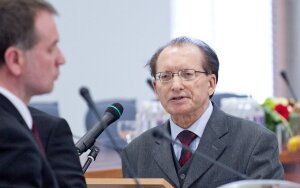- February 11, 2013
- 477
Kwiatkowski: We are going into quite difficult period

Jozef Kwiatkowski, a Member of the Parliament of RL, who has been recently re-elected for a second term of a chairman of the Polish Educational Society in Lithuania, said that Polish education in Lithuania is going through a difficult period; however, some matters will be taken care of.
The MP and the chairman emphasised that the main goal of the Polish Educational Society is to retain the Polish educational system in Lithuania. “We’re going into quite a difficult period. In the past few years, the matters of Polish educational system haven’t left the government and the Sejm’s agenda, not to mention the press, radio or television. EAPL is in the governing coalition, so we very much hope that a progress will be achieved towards some matters,” said Jozef Kwiatkowski in the “Political salon”, the programme broadcast by the “Znad Wilii” radio station.
The chairperson of the PES explained that the standarised exam would not be withdrawn this year but it should be possible to adapt the exam for the needs of the pupils from minority schools. During the previous term, it was possible to negotiate some concessions for the pupils from minority schools. During the exam, pupils can make more mistakes and use dictionaries. “The exam will be standarised in terms of form but in terms of assessment they are different exams. This is just the first stage, because nothing more can be done on this stage,” Kwiatkowski explained. He added that the PES’ stand is firm, i.e. the exams for Lithuanian and non-Lithuanian schools must differ from each other in the future.
At present, PES and EAPL are fighting for more concessions. Today, during a meeting of political council of the governing coalition further options will be examined, i.e. limiting the number of characters in a writing part to 350 – 400 and increasing the number of authors to choose from. “New secondary-school graduates have to choose from among three authors allotted to the topic; they should choose at least one author. We want more opportunities for pupils from minority schools; and don’t limit them to only three authors but to give them a possibility to choose from 35 authors provided by the curriculum,” Kowalski explained proposed options.
Source: http://pl.delfi.lt/aktualia/litwa/kwiatkowski-wchodzimy-w-dosyc-trudny-okres.d?id=60645003
Tłumaczenie Patrycja Olszówka w ramach praktyk w Europejskiej Fundacji Praw Człowieka, www.efhr.eu. Translated by Patrycja Olszówka the framework of a traineeship programme of the European Foundation of Human Rights, www.efhr.eu.

